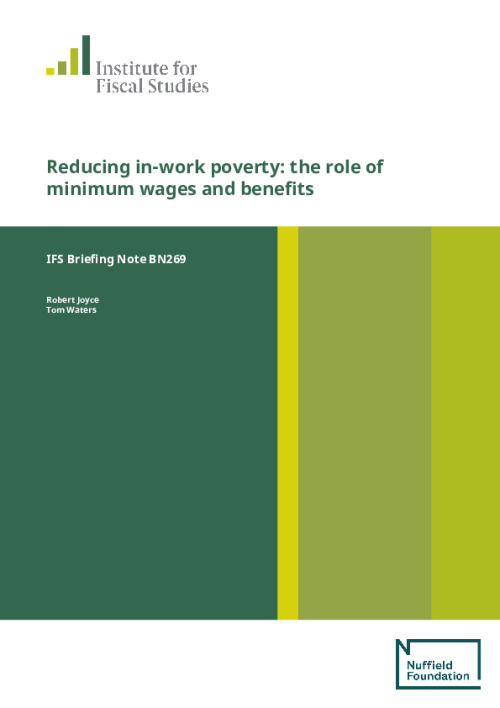Relative in-work poverty has been steadily rising since 1994–95, meaning that the incomes of poorer working households have not been keeping up with those of middle-income households. Alongside falls in worklessness and pensioner poverty, this has resulted in a large shift in the nature of poverty in the UK: it is now primarily a matter of low incomes for households with someone in work. This represents a significant challenge for any government hoping to reduce poverty, and the Labour party have pledged to eliminate in-work poverty within five years. Achieving this target using benefits alone would be very expensive – likely costing many tens of billions per year – partly because about three-quarters of in-work benefit spending goes on households that are not in poverty. Minimum-wage rises, which have been proposed by both major parties, represent an ineffective way to tackle in-work poverty as only a fifth of minimum-wage workers are in poor households, and half are in the top half of the household income distribution – typically because they live with a higher earner. While there certainly are reforms that could make a dent in in-work poverty in the short run or have a larger effect in the long run, eliminating it entirely within five years is another matter. The statement of desire provides a sense of direction and an aspiration but as a specific target it is not plausible.
Key findings:
- Relative in-work poverty has been steadily rising since 1994–95, meaning that the incomes of poorer working households have not been keeping up with those of middle-income households.
- The Labour party have pledged to eliminate in-work poverty within five years. While there are lots of policies that could reduce in-work poverty over the long-run, the list that could make a drastic difference inside five years is considerably shorter.
- Achieving this aim using benefits alone would be very expensive – likely costing many tens of billions per year – partly because about three-quarters of in-work benefit spending goes on households that are not in poverty. The benefit reforms in the Labour party’s manifesto would likely have some effect on in-work poverty, but are nowhere near the scale required to make a very big difference.
- Minimum-wage rises, which have been proposed by both major parties, represent an ineffective way to tackle in-work poverty as only a fifth of minimum-wage workers are in poor households, and half are in the top half of the household income distribution – typically because they live with a higher earner.
- While there certainly are reforms that could make a dent in in-work poverty in the short run or have a larger effect in the long run, eliminating it entirely within five years is another matter. The statement of desire provides a sense of direction and an aspiration but as a specific target it is not plausible.











